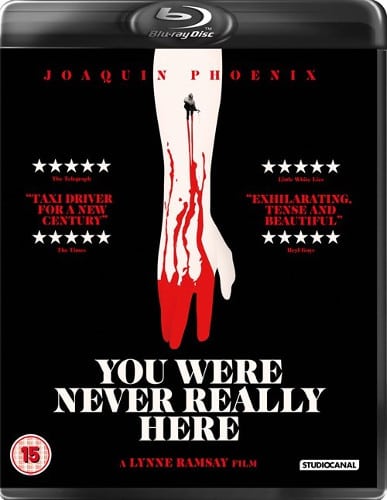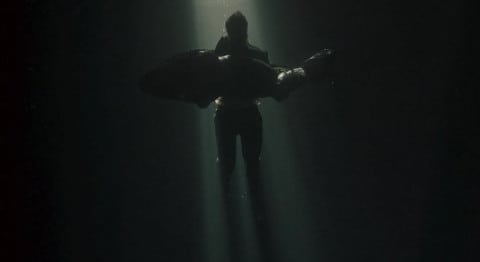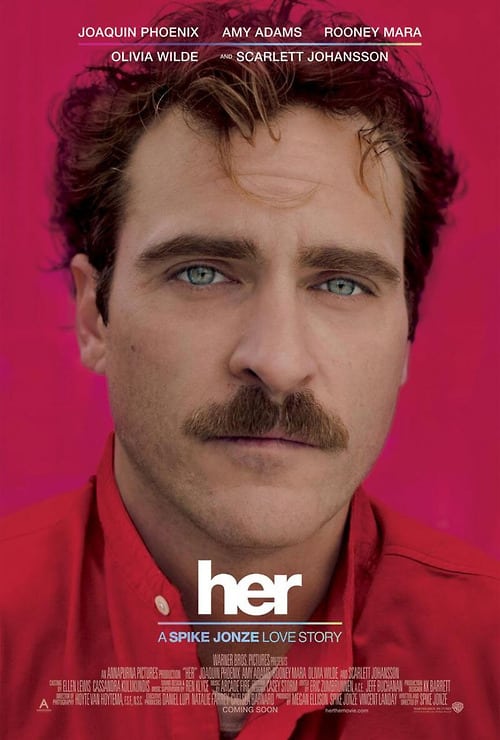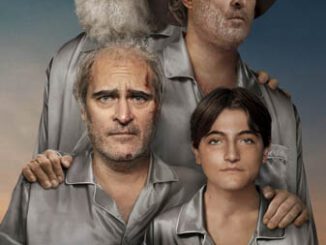You Were Never Really Here (2017)
Directed by: Lynne Ramsay
Written by: Jonathan Ames, Lynne Ramsay
Starring: Alex Manette, Ekaterina Samsonov, Joaquin Phoenix, John Doman
USA
AVAILABLE ON BLU-RAY AND DVD
RUNNING TIME: 90 mins
REVIEWED BY: Dr Lenera, Official HCF Critic
MINOR SPOILERS!
Joe is a hired gun who rescues trafficked girls, using brutal methods against those responsible. Badly affected, with suicidal tendancies, by his childhood abuse at the hands of his father and a brutal past in the military and FBI, he cares for his elderly mother in his childhood home in New York City. While returning home from a job, Joe is seen by the son of Angel, the middleman between Joe and Joe’s handler John McCleary, who expresses his concern that Angel knows his address and may pose a safety risk. Joe then accepts a new job: a New York State Senator, Albert Votto, has offered a large sum of money to whoever discreetly rescues his abducted daughter, Nina.…
I meant to review You Were Never Really Here when it came out in cinemas, but it was a busy week regarding movies to review, and I wasn’t even sure if I liked the thing even though I still admired it. Viewing it for the second time and on Blu-ray revealed it to be of as high quality as the other films from disappointingly non-prolific filmmaker Lynne Ramsey [four films in nineteen years!], if perhaps not quite the near masterpiece that many critics claim. And yes, I liked it rather more, though I should warn you right away [if you haven’t yet seen it] that Ramsey sometimes seems out to be aggravating the viewer as much as possible with the way that she handles her material. It’s quite impressionistic film-making in the sense that it’s based on psychologically significant fragments of images and sounds rather than being particularly plot or dialogue-driven [as sometimes seen before, there’s a clear Nicolas Roeg influence on her work], and this does make sense if you appreciate that Ramsey is trying to tell the story from the point of view of its seriously messed up character. And yes, there are distinct similarities to Taxi Driver, but also some major differences. For example, I get the impression that You Were Never Really There is a man struggling with his mind while Taxi Driver is more about a man struggling with society. In some ways it can be seen more as a companion piece to Ramsey’s earlier Morvern Calling. And, despite what some aspects of the plot may lead you to believe, it’s nothing like Taken. There is some action, but it’s handled in a very oblique fashion as to be seem like a commentary on violent revenge thrillers, and even the people who watch them.
Ramsey certainly doesn’t ease the viewer in gently. A black screen begins the film while we hear a noise that sounds like a distorted version of a airplane landing, indistinct voices, and a voice counting down to one as the screen changes to what seems like underwater and then a close-up of a man trying to suffocate himself with a plastic bag. This is Joe, and he’s as troubled as a person can be. He’s just done a “job”, and we see him washing a bloodied hammer before dumping a bag full of things he’s probably used to kill people in a cleaner’s bin. A man suddenly attacks him in a back street and is beaten in two seconds, telling us even more how deadly this guy is. The Best Actor at Cannes-winning part seems like the ultimate role for Joaquin Phoenix because he’s always especially brilliant when showing internal pain and suffering in a very realistic fashion. This is especially important here because for a while we’re only given quick shots of things like a dying person’s foot moving and a girl with a beaten up face partly hiding behind a pillar as potential reasons for why Joe is the way he is. After a while, these flashbacks begin to have more clarity though you still only get snapshots of a really cruel past full of violence, and some things remain just hinted at. Some viewers may find this frustrating, but there was once a time when adults didn’t seem to require stuff to be spelled out as much. A brief three line exchange between Jo and his mother concerning a girlfriend he had twenty years ago is all that the film needs to tell us that Joe is not a relationship kind of guy, and that attempts by him to lead a more normal way of life have met with failure.
So now, when he’s not caring for his mother, and playing rather dangerously with knives, he does a job in which the violence and pain within him can be used – well – I was going to use the word “productively” or possibly the words “for good” but I guess not every reader will feel that that is the case. “I want you to hurt them” says his latest client. Interesting how Joe prefers old school methods of communication, though it’s perhaps not surprising considering something I read a short while ago about some of today’s espionage reverting back to old school methods because they’re actually safer in a world which is now almost entirely online. There’s a lengthy build up before Joe embarks on his rescue of Nina, but the odd way in which Ramsey will shoot the sequence is foreshadowed in a scene where Joe is angry at his pill dealer for keeping him waiting twenty minutes. Joe seems to attack him but we’re not entirely sure because the act occurs off screen, the camera remaining stationery looking down a hallway as Joe enters the room his dealer is in. Then, when he sets about smashing skulls with a hammer in the house where Nina is being held captive, the action unfolds entirely on security camera footage that goes through different angles so that sometimes we cut away quickly and sometimes we linger on his actions but only at a distance. As a bonus, each time the angle changes, the music we’re hearing, Angel Baby by Rosie And The Pussycats, jumps back by a half second or so. It’s infuriating, challenges us to think about why we find it so [yes, it’s because we like watching violence, but why?] and kind of brilliant, though apparently was done because there wasn’t the money to shoot proper action scenes. And it also gets through how commonplace this must be to Joe, all this death dealing being just another job for him.
Joe and Nina are immediately linked when we first see Nina counting down even before Joe has seen her. The film does really well in showing very quickly a bond forming between the two, even though Joe shouldn’t really give a damn and Nina’s in a drug induced stupor. The more unpleasant aspects of forced child prostitution are soft pedaled somewhat, but Ekaterina Samsonov totally convinces in her part even though she has very little to do. A conspiracy plot suddenly appears when the girl’s Senator father is reported dead on the news and a pair of cops turn up at Joe’s hotel room door with wishes to take Nina. Considering that not all of it is filled in [perhaps it is in the book on which the movie is based], I’m not sure that said conspiracy plot was necessary. The knowledge that some people know where Joe lives [who probably shouldn’t] could have been enough to kick-start the sometimes predictable plot developments thereafter. And perhaps Ramsey teases us just a bit too much when we get the urgent music telling us that we’re going to get our big showdown – which of we don’t see properly. And yet you won’t forget certain images like Nina calmly eating dinner from a bloody plate for ages.
Ramsey often doesn’t seem too concerned with the plot of her own film. A key exposition scene features dialogue between Joe, whose jaw remains clenched shut after being wounded in the face, and a decreasingly conscious man who is bleeding to death. You can only make out around half the words, though of course on Blu-ray and DVD you can just switch on the subtitles. And said scene concludes in a strange but rather moving fashion when the two men sing a song and Joe holds one of his feet as he dies. Ramsey packs her film with odd little details which aren’t always necessary but which add flavour and a humanity to what could have been un-repentantly bleak. I loved, for example, when Nina slowly waves one of her hands as she looks out of the window of Joe’s car at the outside world she’s been denied for some time. A few devices don’t quite come off, like a shakycam fight scene which then gets reflected with steadier camerawork in a ceiling, but Thomas Townend’s often neon-dominated photography is first class throughout especially during some car rides that – yes – give some of the bits in Taxi Driver a run for their money. And Johnny Greenwood’s score is often deliberately jolting, much like the sound effects that try to take us inside Joe’s head, but certainly does its job.
Largely praised by critics but hugely divisive for the rest of us if the IMDB comments are anything to go by [it seems to mostly be either love or hate], You Were Never Really There isn’t the easiest of watches, but I’m sure that you don’t need me to tell you that by now. Ramsey, who seems to have refused to compromise one bit [and hurrah for that], has taken what are undeniably lots of cliches, mixed them up and turned out something that leaves a very lasting impression. No, it’s not quite as stunning as Taxi Driver, but it’s a more positive film. At the end of Martin Scorsese’s classic, that odd “sting” leaves you in no doubt that Travis Bickle has most certainly not exorcised his demons and that it’ll soon probably start all over again. But by the conclusion of You Were Never Really Here, one gets a sense that there’s probably light at the end of the tunnel [interesting how Nina seems to be the strong one at the end] – unless of course much of what you’ve seen isn’t a hallucination or a dream. There seem to be plenty of hints that it could have been.
Rating: 

















Be the first to comment